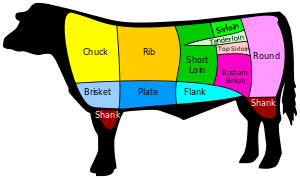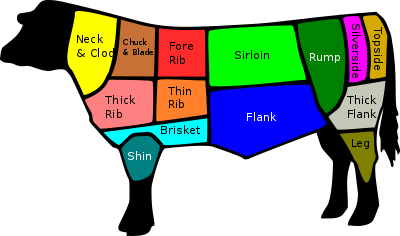Loin
The loins (or: lumbus) are the sides between the lower ribs and pelvis, and the lower part of the back.[1][2][3] It is often used when describing the anatomy of humans and quadrupeds (such as horses,[4][5] pigs[6][7] or cattle[8]). The anatomical reference also carries over into the description of cuts of meat from some such animals, e.g. tenderloin or sirloin steak.[2]
Human anatomy
In human anatomy the term "loin" or "loins" refers to the side of the human body below the rib cage to just above the pelvis.[1] It is frequently used to reference the general area below the ribs. While the term "loin" is generally not used in medical science,[9] some names of disorders do contain it.[10]
The lumbar region of the spinal column is located in the loin area of the body.[11]
Society and culture
The term also has become euphemistic for human genitals[1][2] because of their prominence in that anatomical region. Because of this euphemistic use of the term, the article of clothing that is worn around the genital area has been named a loincloth.
In the Authorized King James Version of the Christian Bible the term "loins" is used frequently. It is suggested that the "loins" is the minimum one must cover on their body to be respectful of the law.[12] This suggests that if a man covers up just his genital area, he is considered clothed enough for public life.
Frequently the expression "fruit of his loins" is used to refer to offspring.[13] Such a "fruit of my loins" reference is also made in the King James Version.[14]
In literature or poetry, an expression such as ‘he felt a stirring in his loins at the thought’ implies a sexual excitement.
It is also used as a term for the general lower area of the body[15] much like the term "below the belt" references the area below where the average person would wear a belt.[16]
The term "gird one's loins" was used in ancient times to describe the process of pulling up and tying the lower portion of the long outer garment between one's legs to increase one's mobility in battle or for work.[17] In the modern age, it has become an idiom meaning to prepare oneself for action, as in:
The phrase "his loins" is about four times more common in books than the phrase "her loins," suggesting that the term "loins" has come to be associated more with men than women.
Loins in butchery


Butchers frequently refer to the section of meat below the rib cage, but above the round (in a carcass hanging from the head end) as loin. Various names of meats further butchered from the loin section of cattle and pork[19] contain the name "loin" such as tenderloin and sirloin. In American culinary arts the loin section of meat from the top half of cattle is divided into three sections.[20] The various cuts of beef from this section are named sirloin, tenderloin, top sirloin, and short loin. They are named for their respective parts on the cattle.
In the British butchery tradition, the same set of muscles is generally referred to as the "rump".
It has been suggested by culinary professionals that tenderloin is the most tender cut of beef one can get.[21] The loin section of beef is fairly popular among consumers for its low fat qualities.[19] It is the source of filet mignon.
See also
Notes and references
- "loin". Dictionary.com Unabridged (v 1.1). Random House, Inc. Retrieved 2008-08-13.
- "loin". Compact Oxford English dictionary of current English. London: Oxford U.P. 2005. ISBN 0-19-861022-X. Retrieved 2008-08-13.
- "Surface Anatomy of the Back - Human Anatomy". Theodora.com. Retrieved 2010-03-17.
- "Body Parts of the Horse". Gaited Horses. Retrieved 2008-08-13.
- "Parts of the Horse Clickable Image - Parts of the Horse The Loin". Horses.about.com. 2009-11-02. Retrieved 2010-03-17.
- "Pork Tenderloin". All Recipes. Archived from the original on 2013-05-29. Retrieved 2010-03-17.
- "Do You Know the Parts of Your Pet Pig?". United Pet Pig Registry, Inc. Retrieved 2008-08-13. extracted from Reeves, David E.; H. Neil Becker; American Association of Swine Practitioners (1993). Care and management of miniature pet pigs: guidelines for the veterinary practitioner. Santa Barbara, California: Veterinary Practice Pub. Co. ISBN 0-9603534-3-7.
- "Recipes - Roast Beef Tenderloin". Cooks.com. Retrieved 2010-03-17.
- "Loin definition - Medical Dictionary definitions of popular medical terms easily defined on MedTerms". Medterms.com. 1998-03-26. Retrieved 2010-03-17.
- "Loin Pain Hematuria Syndrome". Webmd.com. Retrieved 2010-03-17.
- "Anatomy - Lumbar Spine". Back.com. Retrieved 2010-03-17.
- "BibleTab". Loincloth. 2005. Retrieved 2008-06-26.
- "TheFreeDictionary Idoms Collection". Fruit of [his\my] Loins. 2005. Retrieved 2008-06-26.
- "ScriptureText". Acts 2:30. 2005. Retrieved 2008-06-26.
- "GraceCathedral". Sermon Exserpts. 2005. Archived from the original on 2008-10-12. Retrieved 2008-06-26.
- "Phrases.org.uk". Phrase Meanings: Below the Belt. 2005. Retrieved 2008-06-26.
- G. Johannes Botterweck & Helmer Ringgren (1981). Theological Dictionary of the Old Testament. 4. Wm. B. Eerdmans Publishing. p. 442. ISBN 9780802823281. Retrieved 1 February 2016.
- Leslie L. Nason, Ed. D. (6 October 1965), "School of your Choice", Lawrence Daily Journal, p. 3, retrieved 1 February 2016
- Rattray, Diana. "Pork Tenderloin Recipes". About.com. Retrieved 2008-08-13.
- "GourmetSleuth". Guide to Beef Cuts. 2005. Retrieved 2008-06-26.
- "Steak: Grades & Cuts - Know what beef to buy". Bbq.about.com. 2009-10-30. Retrieved 2010-03-17.